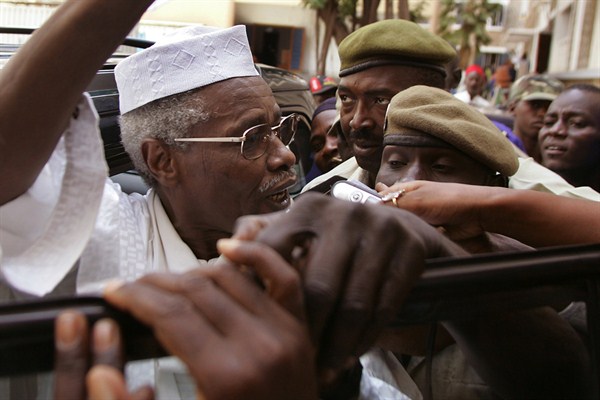Since it was formally established in 2002, the International Criminal Court has been far more active in Africa than in any other region of the world. The court currently has investigations open in nine countries on the continent, and is conducting “preliminary examinations” in three others. As demonstrated this month when the ICC overturned its 2016 conviction of Jean-Pierre Bemba, the former vice president of Democratic Republic of the Congo, the court’s activities can have major political consequences in all these places.
Yet when it comes to transitional justice, the ICC is hardly the only game in town in Africa. Countries recovering from conflicts or moving on from dictatorships are also pursuing a range of domestic proceedings, including truth commissions and special tribunals. The following 10 WPR articles examine those various efforts and the barriers to their success.
The following 10 articles are free for nonsubscribers until July 12.
A Global Framework
The ICC Is Flawed. Is It Still Africa’s Best Hope for Justice?
In December 2016, Dominic Ongwen, a former senior commander in the Lord’s Resistance Army, went on trial at the ICC amid growing opposition to the tribunal in Africa. Andrew Green explained how Ongwen’s trial could prove that the ICC remains the best mechanism for delivering justice to victims of war crimes.
Can International Justice Survive in an Age of Renewed Nationalist Fervor?
The worldwide resurgence of populism and nationalism appears to pose an existential challenge to the principle that even the powerful should be held accountable for horrific crimes. James A. Goldston argued that international justice can survive, and even thrive, in this more hostile climate, provided it can adapt.
Litigating the Past
How Survivors of Sexual Assault Helped Bring Chad’s Former Dictator to Justice
When Hissene Habre, Chad’s former president, went on trial for war crimes in Senegal in 2015, the original charges did not include any mention of sexual violence. In this in-depth report adapted from her book on the trial, Celeste Hicks documented how dramatic testimony, including from one woman who said Habre himself raped her, helped move such crimes closer to the top of the agenda of international criminal law.
In the Post-Compaore Era, Burkina Faso’s Courts Try to Find Their Voice
A court in Burkina Faso resumed hearings in April in a trial against the alleged perpetrators of a short-lived coup nearly three years ago. Robbie Corey-Boulet outlined how the trial is part of a broader effort to show that courts there can assume a leading role in helping the West African country work through its tumultuous recent past.
Despite a Year of Mutinies, Cote d’Ivoire’s Courts Keep Their Focus on Gbagbo
A spate of trials targeting high-profile members of former President Laurent Gbagbo’s government has again highlighted the strikingly biased approach to transitional justice in Cote d’Ivoire. Yet those who have benefited from this “victor’s justice” are the same people who have most jeopardized the country’s postwar recovery, according to Robbie Corey-Boulet.
Demands for Justice in Gambia Rise, but So Do Fears of Renewed Repression
Gambian President Adama Barrow has promised to pursue accountability for crimes committed under longtime dictator Yahya Jammeh, who fled into exile last year. But Alex Thurston explained why some Gambians are decrying familiar signs of creeping authoritarianism, despite the arrest of several of Jammeh’s top former associates.
As Liberia Debates Justice for War Crimes, a Rebel Faces Trial in the U.S.
Last year’s trial in Philadelphia of a former Liberian rebel commander marked the first time victims of Liberia’s first civil war were able to testify in a criminal trial. Robbie Corey-Boulet wrote about how the case was also helping to fuel discussion of how Liberia should deal with its horrific legacy of violence.
Ongoing Conflicts
Warlord’s Conviction in Central African Republic Is a First Step Toward Justice
In January, a court in the Central African Republic convicted and sentenced a former warlord to life in prison, a first for a country that has been gripped by violence for years. In an interview, Elise Keppler and Lewis Mudge discussed the conviction and whether the Central African Republic’s justice system can continue to deliver meaningful convictions.
Should Somalia Prosecute or Offer Amnesty to Al-Shabab Leaders Who Surrender?
Last August, Somalia’s government won a perceived victory against al-Shabab when Mukhtar Robow, the former deputy leader of the militant group, surrendered. Yet Yasin Ahmed Ismail warned that as with other recent defections, the circumstances of Robow’s surrender suggest it may not represent a major turning point in the battle against al-Shabab.
Why the ICC May Turn Its Attention to Crimes Against Migrants in Libya
The lack of progress in bringing Saif al-Islam Gadhafi, the son of Libya’s late dictator, before the ICC reflects the challenges that have dogged the court’s work in Libya for years. In an interview, Mark Kersten explained the court’s limitations and its new interest in crimes allegedly committed against migrants in Libya.

